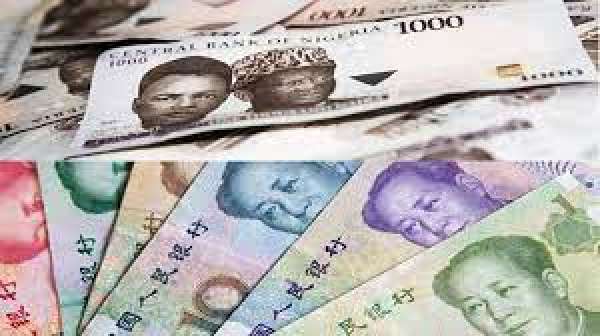Importers from China have continued to trade in US dollars than convert directly to the Chinese Yuan despite the $2.5billion currency swap deal for at least 15billion Yuan (Renminbi) between Nigeria and China three years ago, LEADERSHIP Sunday investigations have revealed.
The deal failed to make the desired impact on the stability of the Naira, as bureaucracy and conversion bottlenecks slowed the utilization of the window by Nigerians, while the Chinese businesses preferred to deal in dollars.
With the three years for the initial agreement already up, feelers from the industry indicate that the Central Bank of Nigeria (CBN) may not renew the deal since it failed to achieve the desired result.
Traders and importers, it was learnt, prefer US dollars as a medium of exchange in business transactions between them and Chinese companies.
This, however, negates the principle of the currency swap deal, as the process is fueling price hike of goods coming from China, especially with the rate at which the Naira is trading against the US currency.
It was gathered that Renminbi auctions, bureaucracy and bottlenecks were major challenges faced by traders and importers carrying out business transactions with China.
These have, however, become disincentives to the use of Naira to Yuan in trade deals between Nigerian importers and the Chinese firms.
But if the process of converting Naira directly to Yuan has been seamless and rid of bottlenecks, experts said, it will lead to reduction in the prices of goods coming from China, while lifting off the pressure from dollar, thereby, giving room for the nation’s currency to grow strength.
The aforementioned challenges have ensured that the target of $2.5 billion to 15 billion Renminbi to be swapped has not been met three years after.
In April 2018, CBN and the People’s Bank of China (PBoC) executed a currency swap agreement on behalf of their respective countries.
CBN, Nigeria’s apex bank, issued the regulations for the US$2.5 billion currency swap agreement in June the same year as the deal was signed to facilitate trade between the two countries and enhance foreign reserve management.
The Bilateral Currency Swap (BCS) agreement was to allow importers of goods from China to conclude their transactions in Yuan instead of the greenback (US Dollar) and vice-versa. This was done to reduce the demand of the US Dollar.
In December 2020, the Naira against the Chinese Yuan further depreciated by -30.27 per cent against the gains recorded in 2018, which can be attributed to lower demand for the Yuan as the US dollar became even more expensive for business transactions despite more awareness of the swap deal with China by traders and the adjustment of the Naira by CBN during the period.
Analysts at Proshare expected the Naira to have depreciated further against Yuan.
This is because converting directly to the Chinese currency for transaction in China would be cheaper than converting to US Dollar, then converting to the Yuan for importation/trading.
Speaking with LEADERSHIP Sunday at the weekend, the managing director/CEO, Centre for Promotion of Private Enterprise (CPPE), Dr Muda Yusuf, said: “The currency swap is about $2.5 billion equivalent of China currency, Yuan (CNY), and it is for three years. Hence, this cannot even be compared with $20 billion business volume of trade between Nigeria and China in a single year.
“Talking of currency swap of just about $2.5 billion, it is not significant and we are talking about this amount for a period of three years. Also, many suppliers from China prefer to trade in dollars; they are more comfortable with dollars, especially with what is happening to our currency. The preference for dollars is still very predominant on both parties involved. There is exchange rate issue between the Naira and the Yuan.”
Similarly, an entrepreneurship and business management expert, Dr Timi Olubiyi, stated that the naira-yuan swap has grossly not been utilised to its fullest.
According to him, the dollar has remained the dominant currency of imports since its inception, thereby making it impossible for Nigerians to reap the benefit of the deal.
In the same vein, the head, Retail Investment, Investment Management Group at Chapel Hill Denham, Ayodeji Ebo, stated that while the initiative was a laudable one, it has not had any major impact as it ought to.
“We have not seen any major impact it has had because the value of the swap deal that was done viz-a-viz the value of imports from china is still very small. So, because of that insufficiency, there are a lot of importers and dealers who when they try once and they don’t have access to it, they don’t try again. They just continue with their old method.
“I also don’t think a lot of the suppliers are open to receiving the Reminbi. It was a good initiative but I am not sure it has achieved much because the value of the swap deal is very low compared to trade volume with China.”
Meanwhile, a senior analyst with FXTM, Lukman Otunuga, said the deal failed to achieve its goal three years after it was launched because the same destructive forces sabotaging the Naira are still present as ever.
“A terrible combination of dollar shortages, inflationary pressures, weak macroeconomic conditions, exposure to external risks, and multiple exchanges continue to weigh heavily on the local currency,” he noted.
Corroborating what the experts said, a Lagos businesswoman known as Mrs Sam said she buys interiors and gift items from China using her dollar account because the bureaucracy of securing them with Yuan was too cumbersome for her.
According to her, over 80 per cent of people she knows who do business with China boycott the currency swap deal of the government because the processes involved are not straightforward, which leads to unnecessary delays.







